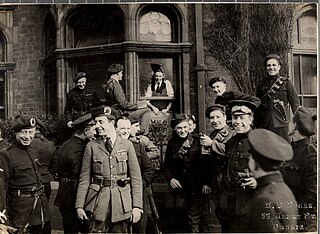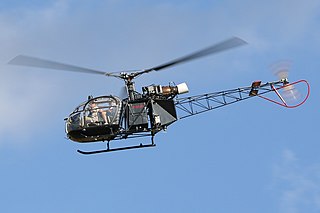Related Research Articles
"The Men Behind the Wire" is a song written and composed by Paddy McGuigan of the Barleycorn folk group in the aftermath of Operation Demetrius.

The Wolfe Tones are an Irish rebel music band that incorporate Irish traditional music in their songs. Formed in 1963, they take their name from Theobald Wolfe Tone, one of the leaders of the Irish Rebellion of 1798, with the double meaning of a wolf tone – a spurious sound that can affect instruments of the violin family.

Ruairí Ó Brádaigh was an Irish republican political and military leader. He was Chief of Staff of the Irish Republican Army (IRA) from 1958 to 1959 and again from 1960 to 1962, president of Sinn Féin from 1970 to 1983, and president of Republican Sinn Féin from 1987 to 2009.

Come Out, Ye Black and Tans is an Irish rebel song referring to the Black and Tans, or "special reserve constables", recruited in Great Britain and sent to Ireland from 1920, to reinforce the Royal Irish Constabulary (RIC) during the Irish War of Independence. The song was written by Dominic Behan as a tribute to his Irish Republican Army (IRA) father Stephen, who had fought in the War of Independence, and is concerned with political divisions in working-class Dublin of the 1920s. The song uses the term "Black and Tans" in the pejorative sense against people living in Dublin, both Catholic and Protestant, who were pro-British. The most notable recording was in 1972 by the Irish traditional music group, The Wolfe Tones, which re-charted in 2020.

Máirtín Ó Cadhain was one of the most prominent Irish language writers of the twentieth century. Perhaps best known for his 1949 novel Cré na Cille, Ó Cadhain played a key role in reintroducing literary modernism into modern literature in Irish, where it had been dormant since the 1916 execution of Patrick Pearse. Politically, Ó Cadhain was an Irish republican and anti-clerical Marxist, who promoted the Athghabháil na hÉireann, . Ó Cadhain was also a member of the post-Civil War Irish Republican Army and was interned by the Irish Army in the Curragh Camp with Brendan Behan and many other IRA members during the Emergency.

Mountjoy Prison, founded as Mountjoy Gaol and nicknamed The Joy, is a medium security men's prison located in Phibsborough in the centre of Dublin, Ireland. The current prison Governor is Edward Mullins.

Seamus Twomey was an Irish republican activist, militant, and twice chief of staff of the Provisional IRA.

The executions during the Irish Civil War took place during the guerrilla phase of the Irish Civil War. This phase of the war was bitter, and both sides, the government forces of the Irish Free State and the anti-Treaty Irish Republican Army (IRA) insurgents, used executions and terror in what developed into a cycle of atrocities. From November 1922, the Free State government embarked on a policy of executing Republican prisoners in order to bring the war to an end. Many of those killed had previously been allies, and in some cases close friends, of those who ordered their deaths in the civil war. In addition, government troops summarily executed prisoners in the field on several occasions. The executions of prisoners left a lasting legacy of bitterness in Irish politics.
"The Broad Black Brimmer" is an Irish Republican folk song written by Art McMillen.
Marion Coyle is a former member of the Provisional Irish Republican Army (IRA).

Seán Cronin was a journalist and former Irish Army officer and twice Irish Republican Army chief of staff.
The Maze Prison escape took place on 25 September 1983 in County Antrim, Northern Ireland. HM Prison Maze was a maximum security prison considered to be one of the most escape-proof prisons in Europe. It held prisoners suspected of taking part in armed paramilitary campaigns during the Troubles, with separate wings for loyalists and for republicans. In the biggest prison escape in UK history, 38 Provisional Irish Republican Army (IRA) prisoners escaped from H-Block 7 (H7) of the prison. One prison officer died of a heart attack during the escape and twenty others were injured, including two who were shot with guns that had been smuggled into the prison.
Paul "Dingus" Magee is a former volunteer in the Belfast Brigade of the Provisional Irish Republican Army (IRA) who escaped during his 1981 trial for killing a member of the Special Air Service (SAS) in 1980. After serving a prison sentence in the Republic of Ireland, Magee fled to England where he was imprisoned after killing a policeman in 1992. He was repatriated to the Republic of Ireland as part of the Northern Ireland peace process before being released from prison in 1999, and subsequently avoided extradition back to Northern Ireland to serve his sentence for killing the member of the SAS.

The Mountjoy Prison helicopter escape occurred on 31 October 1973 when three Provisional Irish Republican Army (IRA) volunteers escaped from Mountjoy Prison in Dublin, Ireland, by boarding a hijacked helicopter that briefly landed in the prison's exercise yard. The escape made headlines around the world and was an embarrassment to the Irish coalition government of the time, led by Fine Gael's Liam Cosgrave, which was criticised by opposition party Fianna Fáil. A manhunt involving twenty thousand members of the Irish Defence Forces and Garda Síochána was launched for the escapees, one of whom, Seamus Twomey, was not recaptured until December 1977. The Wolfe Tones wrote a song celebrating the escape called "The Helicopter Song", which topped the Irish popular music charts.
"Kevin Barry" is a popular Irish rebel song recounting the death of Kevin Barry, a member of the Irish Republican Army (IRA) who was hanged on 1 November 1920. He was 18 years old at the time. He is one of a group of IRA members executed in 1920–21 collectively known as The Forgotten Ten.

Sheila Humphreys, also known as Sighle Humphreys, was an Irish political activist and member of Cumann na mBan.

The Wolfe Tone Societies is an Irish republican group whose chief objective is the establishment of a 'united Irish Republic.' It evolved from the commemorative Directories which the IRA helped set up in 1963 to mark the bicentenary of the 1763 birth of Wolfe Tone. In 1964 the Directories were dissolved and replaced with the Wolfe Tone Society. The publication of the Wolf Tone Society from 1965 onward was called Tuairisc.
In October 1923 mass hunger strikes were undertaken by Irish republican prisoners protesting the continuation of their internment without trial. The Irish Civil War had ended six months earlier yet the newly formed Provisional Government of the Irish Free State was slow in releasing the thousands of Irish republican prisoners opposed to the Anglo-Irish Treaty.

Andy O'Sullivan was an Intelligence Officer and regional leader in the Irish Republican Army who died during the 1923 Irish hunger strikes while in prison.
Celtic Symphony is a song by The Wolfe Tones, written to celebrate the centenary of Celtic Football Club. It has become a staple song for Irish nationalism and Irish sports teams which has led to controversy due to its lyrics.
References
- 1 2 Kinealy, Christine (2010). War and Peace: Ireland since the 1960s. Reaktion Books Ltd. ISBN 978-1780231136.
- ↑ Parfitt, Richard (9 November 2015). "A Four Nations Reception History of The Wolfe Tones". fournationshistory.wordpress.com. Retrieved 16 March 2017.